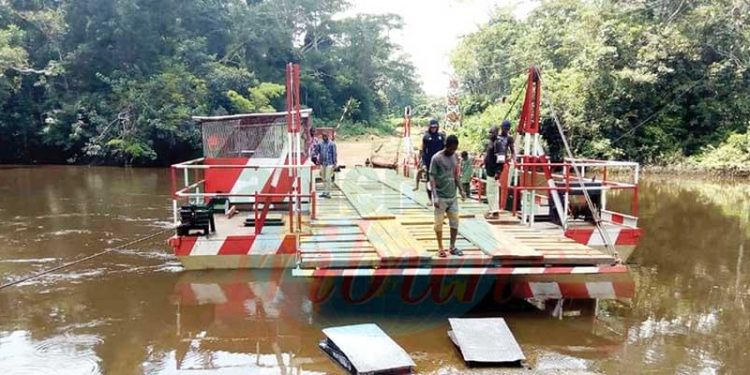By Louvier Kindo Tombe
When we arrived River Boumba in Biwala1, Yokadouma council, Boumba and Ngoko Division of the East region of Cameroon, we saw two motorbikes on the ferry boat including a car with it’s occupants standing besides ready to be ferried to the other side of the river. The ferry driver was about to start the engine, but on seeing us he decided to wait. As we approached we noticed that everyone was happy. Their discussion was jovial on the ferry boat. No one showed signs of fear or panic despite the old state of the boat.
“We don’t have a choice, there is no other means to cross the river with our bikes”, one of the riders told us.
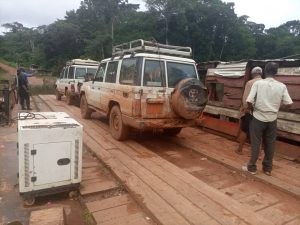
“If you are afraid of the ferry, then you are not ready to cross the river”, a man in his 50’s, who was also onboard the ferry added.
The ferry over river Boumba in the Boumba and Ngoko Division of the East region is the only means through which persons, vehicles and goods leave from Biwala 1 to Biwala 2 and vice versa.
A good quantity of timber from the forest in the East region is ferried over the river to Yokadouma town.
8 agents have been recruited by the Yokadouma council to work on the ferry. Some work during the day, while others at night. They are committed to the job to a point where it becomes difficult to do without.
“When I am not here, is like am sick”, one of the worker said smiling at us.
Most people in the Boumba and Ngoko Division live on farming, hunting, fishing and other agriculture related activities, but the ferry workers chose to serve the nation through the Yokadouma council.
“There are moments that I spend hours here alone waiting for those to cross to the other side, but am not complaining”, says the ferry driver who was on duty upon our arrival.
Crossing over the ferry is free for pedestrians, but motorbikes and vehicles pay before they are been ferried across.
Motorbikes pay FCFA 500, cars of 5 places – FCFA 1.000, Pick-ups and Jeeps – 2.000 while trucks pay between FCFA 8.000 – 10.000.
On a daily basis when timber is actually being transported, the workers are able to raise between FCFA 200.000 – 800.000. It could be a bit less during rainy days.
We were lucky to meet two of the ferry workers on seat. They were actually not complaining of anything until when they discovered that we were a team of reporters on a mission in the Division.
When we finally crossed the river, the ferry driver approached us saying that “so you guys are journalists, please help tell our story to the rest of the world, we are suffering here in Biwala.”
The statement did not ring a bell to us, because we rather envied them for living in an environment with all natural resources at their disposal. But it became interesting when the driver voiced out that “we have gone for over 36 months without salaries.”
That is when we decided to give a listening ear to their cries. Before we could discover, the chief of the ferry post was already with us from no where. According to the Chief, Mr. Pibot Mermouse, they are 8 in number working at the ferry in shifts both day and night an they were recruited by the Yokadouma council in a basic salary of FCFA 50.000 per month. Most of them did not receive pay for up to 6 months.
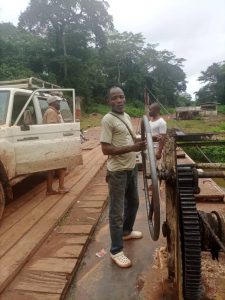
“It is over 3 years today that they stopped paying me”, the driver who crossed us laments.
“How do they think that we are coping with our families“, he continued.
At first we did not understand how people could be working and collecting money for the council on a daily basis and yet are not being paid. The chief of post, took the pains to edify us.
“We can not play games with the money we collect because every single activity is noted in a booklet and council agents pass from time to time to collect money already at our disposal”, he said adding that “the council has a way of verifying the number of cars and bikes that cross over the ferry daily.”
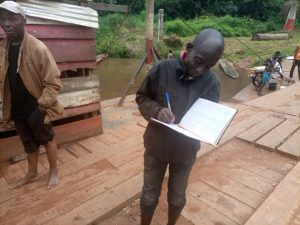
Work without pay is just part of the difficulties faced by the workers.
“If we want to tell you how we work here, you may cry in our place”, whispered one of the night workers who just joined the discussion.
“If you were keen, you would have discovered that I had to strike two loose cables in order to start this ferry boat, the keys got bad its years today”, the ferry driver said.
The state of the boat was actually a call for concern as even some members of our delegation were afraid to cross at first sight.
Besides the state of the boat, the workers lack basic materials like boots, gloves, life jackets, … etc.
Those who work during the night have some specific challenges given that electricity is a key problem in the locality.
“We don’t have touches to work with and you see the forest that surrounds us, the one I have I bought it myself for my safety”, the night worker revealed.
Some of the workers, we were told were seriously sick that particular period.
Despite the difficult conditions of work, the ferry agents still have their work at heart.
“We are always on seat even when the boat is bad”, the Chief of post said.
It is common for the ferry boat over river Boumba to get bad owing to the weight of cars that cross over especially timber trucks. Repairing the boat is not a day’s job, because the nearest mechanical engineer is kilometres away and funds are not always available on time.
“When there is a breakdown, we cover about 70 Kms to Mindourou, just to get the part in question. It is not sold around here”, the Chief of post told us.
Because of time, we (team of reporters) had to continue our journey to Gribe, a Bantu village hosting Baka Pygmies. But before we left, the Chief of post reiterated their cry to us.
“Our immediate worry is the payment of our salary arrears, and if the government can help in upgrading our working conditions, we shall be grateful”, he said.
The Ferry Network in Cameroon
The ferry network in Cameroon is managed by the Ministry of Public Works.
In recent past according to bougna.net, Cameroon had a network of 34 ferry crossings with 7 in the centre region, 8 in the East region, 1 in the South region, just to name but these. The ferries are owned both by government and private individuals and institutions.
A good example of a privately owned ferry boat is the Matouke Estate Ferry, in the South West region of the country. Owned by the Cameroon Development Corporation (CDC), it was in its good old days created to transport plantation workers from one estate to another.
Other ferries in the network include;
Ngoura ferry on the Kadey River in the Lom and Djerem Division.
The Loupe ferryboat on the Boumba River, Boumba and Ngoko Division of the East region.
Nlobesse’e ferry over River Dja in the South region.
Somalomo ferry on the Dja River in the Upper Nyong Division
Bissaga ferry on river Sanaga, and many others.
A good number of the ferries in Cameroon have been replaced with bridges like the ferry over river Sanaga in the Center region.
Some are in very poor states affecting transportation in their respective localities.
On the 7th of June 2022, about 10 people lost their lives as their locally made boat overturned in the Nyong river, in a locality known as Malombo, Makak Sub Division of the Nyong and Kelle Division of the Center region.
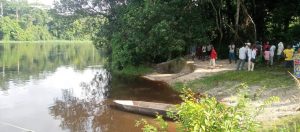
Most were members of the same family who were crossing to the other side of the river inside a canoe because the ferry boat in the area had a breakdown.
